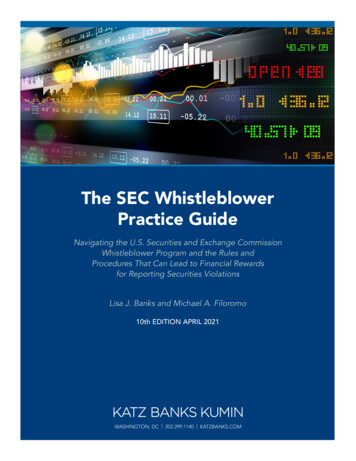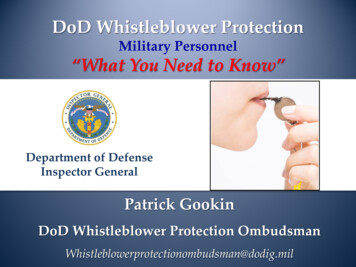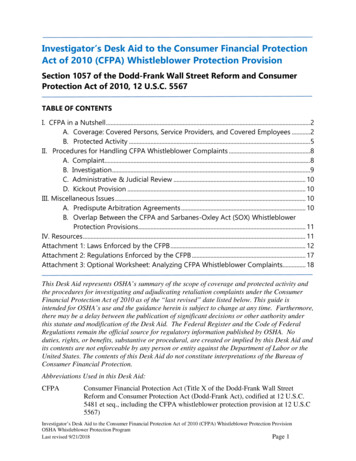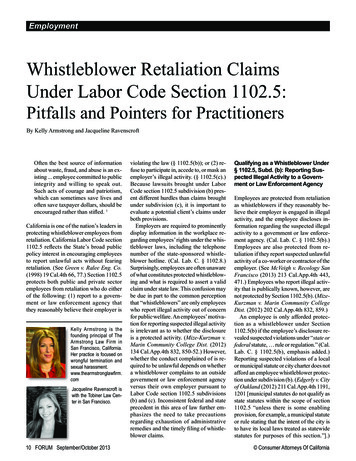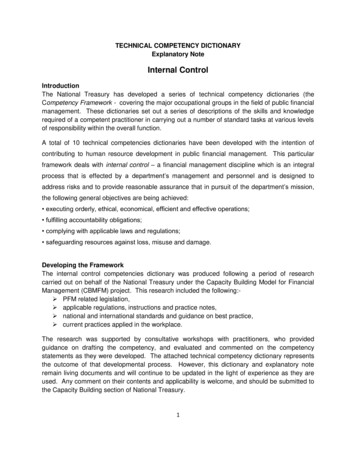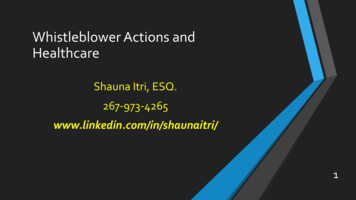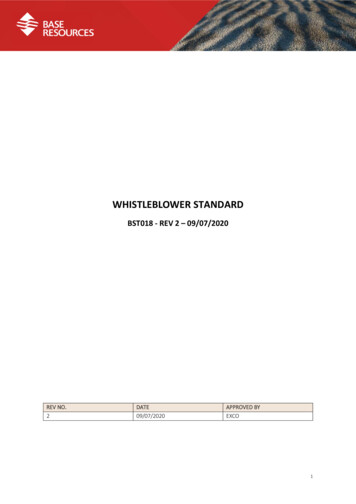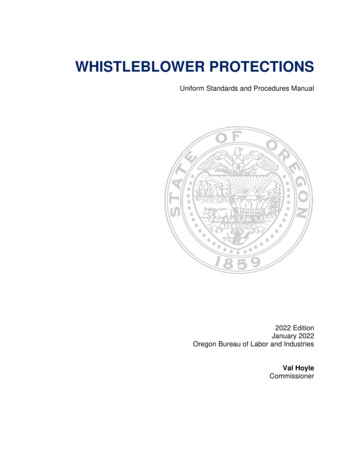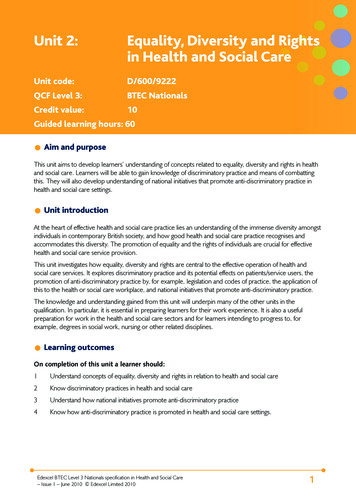
Transcription
March 2022WHISTLEBLOWER PROTECTION ACTOVERVIEWThe Whistleblower Protection Act of 1989 (WPA) prohibits retaliation against most executive branch employees when they blow thewhistle on significant agency wrongdoing or when they engage in protected conduct.The WPA, an evolution of the Civil Service Reform Act of 1978, was amended in 1994 and further strengthened in 2012 with theunanimous passage of the Whistleblower Protection Enhancement Act. It has garnered strong bipartisan support in both chambers.Who Is(n’t) Covered?Most executive branch employees, former employees, and applicants fall within the WPA’s protections because they are part of themerit system that governs the federal civil service under Title 5 of the U.S. Code. Employees of the Government Publishing Office, aLegislative Branch agency, are also covered. (5 U.S.C. § 2302(a)(2)(C)).However, some executive branch employees are excluded from the WPA’s protections, including (but not limited to): Political appointees (e.g. federal inspectors general)Uniformed military service membersNoncareer Senior Executive Service employeesEmployees of the 17 different intelligence community “elements” and the FBIMembers of the U.S. Public Health Service Commissioned CorpsOfficers of the National Oceanic and Atmospheric Association (NOAA) Commissioned CorpsEmployees of the U.S. Postal ServicePROTECTIONS UNDER THE WPA : DISCLOSURES AND CONDUCTExecutive Branch employees are poised to shine a light on wrongdoing within their agency, including on potential misuse of taxpayerdollars. With that in mind, the WPA outlines several categories of lawful disclosures and conduct under 5 U.S.C. § 2302(b)(8)-(9).Importantly, the WPA imposes a “reasonable belief” standard when determining whether a disclosure falls within the law’sprotection. The core test for a reasonable belief is whether peers with equivalent knowledge could agree with the whistleblower’sconcerns. Accordingly, even if the employee is mistaken in what they are disclosing, they will still be protected if their mistakenbelief was reasonable under the circumstances.Further, except for credibility determinations, a whistleblower’s motive for speaking out is irrelevant—no matter why thewhistleblower made their disclosure, they can still seek legal protections under the law for the information they brought to light. (5U.S.C. § 2302(f)).Protected Disclosures of InformationThe WPA protects covered employees who disclose information that they reasonably believe evidences any of the following: A violation of any law, rule, or regulation Gross mismanagement A gross waste of funds An abuse of authority A substantial and specific danger to public health or safetyLegal Disclaimer: This document is for general informational purposes only. Its contents are not legal advice.
The WPA also protects disclosures concerning agency policy decisions and/or censorship related to research, analysis, or technicalinformation if the whistleblower reasonably believes that the consequences of the policy decision or censorship at issue would resultin one of the protected categories of misconduct listed above. Mere disagreement with management over agency policy will not beprotected under the WPA. (5 U.S.C. § 2302(a)(2(D)).Audience for DisclosuresProtected disclosures can be made either internally to others within the agency, or externally with exceptions for sensitive material.The WPA protects public disclosures as long as the underlying information is not restricted from release by executive order orspecifically prohibited by statute. (5 U.S.C. § 2302(b)(8)(A)).Examples of common audiences for protected disclosures include: Congress The Office of Special Counsel (OSC) Offices of Inspectors General Co-workers or managers Independent government watchdog organizations The mediaWhen a public disclosure is not protected by the WPA, the law still protects disclosures to federal inspectors general, the Office ofSpecial Counsel, and individuals within the whistleblower’s agency who are authorized to receive the information. (5 U.S.C. §2302(b)(8)(B)).A NOTE ON CLASSIFIED INFORMATIONIt is unlawful to disclose information that is expressly designated as classified outside of lawful channels. Doing so could result incriminal prosecution.The WPA protects disclosures of classified information to properly cleared recipients in Congress if the information being disclosedwas classified by the head of a non-intelligence element agency and if the disclosure does not reveal intelligence sources andmethods. (5 U.S.C. §2302(b)(8)(C)).THE ROLE OF CONFIDENTIALITYA whistleblower making disclosures under the WPA may or may not want confidentiality. Certain audiences are required to maintaina whistleblower’s confidentiality when they receive a disclosure unless they have the whistleblower’s express written consent, orunless certain exceptions come into play. Specifically: The House of Representatives is now required to maintain whistleblower confidentiality except in certain limitedcircumstances laid out in the House Code of Official Conduct (clause 21 of rule XXIII). The Office of Special Counsel is required to maintain confidentiality unless necessary because of an imminent danger topublic health and safety or an imminent violation of criminal law. (5 U.S.C. §1213(h)). Federal inspectors general are required to maintain confidentiality unless “otherwise unavoidable in the course of theinvestigation.” (Inspector General Reform Act of 1978; 5 U.S.C. App. §7).Importantly, whistleblowers whose confidentiality is improperly exposed do not have access to a remedy under the WPA.WHISTLEBLOWER RIGHTS SUPERSEDE AGENCY ORDERS RESTRICTING SPEECHAgencies cannot gag employees from making lawful disclosures through policy, order, or agreement. Any kind of restriction onemployee speech must contain verbatim the clause in 5 U.S.C. § 2302(b)(13) that declares the supremacy of whistleblower rights inthe event of a conflict.Legal Disclaimer: This document is for general informational purposes only. Its contents are not legal advice.
Investigating the Alleged MisconductOnce a whistleblower has made their disclosure, an independent investigation into the allegations may follow. The findings of theseinvestigations may lead to policy changes or other corrective action following verification of the underlying wrongdoing.Any lawful recipient of a whistleblowing disclosure can investigate allegations. Whistleblower disclosures are frequently investigatedby offices of inspectors general, Congress, the media, and independent government watchdog organizations, for example. Of note,disclosures to the Office of Special Counsel (OSC) follow a time-bound investigation process through which OSC can order an agencyinvestigation of the whistleblower’s disclosure, controlled by statutory requirements. These investigations are often conducted bythe relevant office of inspector general while being overseen by OSC. (5 U.S.C. § 1213).The final agency report, along with the whistleblower’s comments and OSC’s own evaluation, are made public on OSC’s website andare shared with leadership of the congressional committees of jurisdiction as well as the President.Protected ConductIn addition to protecting disclosures of information, the WPA also prohibits retaliation when covered employees engage in certainconduct, including: Exercising any appeal, complaint, or grievance rightTestifyingLawfully assisting another person with exercising their rightsCooperating with the investigation of an inspector general or other agency investigator, or the Office of Special CounselRefusing to obey an order that would require violation of a law, rule, or regulationENFORCEMENT PROCESSThe WPA prohibits those with authority from taking, failing to take, or threatening to take certain “personnel actions” because of acovered employee’s protected disclosure or conduct. (Personnel actions: 5 U.S.C. § 2302(a)(2)).Investigating the Retaliation and AdjudicationThe process for seeking relief from potential unlawful retaliation is complex and involves several different entities and strict timelimitations for filing claims and appeals. It is advisable that whistleblowers consult a knowledgeable attorney.OFFICE OF SPECIAL COUNSEL (OSC)Whistleblowers covered under the WPA can file a retaliation claim with OSC, an independent agency that investigates and canprosecute any prohibited personnel practices – including unlawful whistleblower retaliation. The WPA imposes a three-year statuteof limitations for filing a retaliation claim with OSC. (5 U.S.C. § 1214(a)(6)A)(iii)).CAN SEEK ENFORCEMENT: If OSC’s investigation finds unlawful retaliation, the Special Counsel can recommend that thewhistleblower’s agency correct the personnel action and can seek disciplinary action against the retaliator. OSC can also seek toenforce its recommended corrective actions through the Merit Systems Protection Board (MSPB), a quasi-judicial agency that hasthe power to compel agency action.If OSC does not obtain relief within 120 days, the whistleblower can take their claim directly to the MSPB. (5 U.S.C. § 1221).MEDIATION: OSC also maintains an Alternative Dispute Resolution (ADR) program through which a whistleblower and an agency cantry to negotiate terms of a settlement.“STAYS”: OSC can also ask the MSPB to issue legally binding temporary relief or “stays” of the pending personnel action whileawaiting the outcome of the whistleblower’s claim. (5 U.S.C. § 1214(b)(1)(A)(i)). This is significant because investigations regularlytake over a year to complete.Legal Disclaimer: This document is for general informational purposes only. Its contents are not legal advice.
MERIT SYSTEMS PROTECTION BOARD (MSPB)The Merit Systems Protection Board is an independent, quasi-judicial federal agency that, among other functions, receives andadjudicates whistleblower retaliation claims under the WPA. TWO PATHS: Whistleblowers who experienced personnel actions such as termination, suspension of more than 14 days, orreduction in grade or pay may appeal those actions directly to the MSPB. These are called “otherwise appealable actions.” Forother personnel actions, whistleblowers must first exhaust administrative options before the OSC before taking their case to theMSPB. This is called an “individual right of action.” (Note: Whistleblowers who can go directly to MSPB may first file with OSC). STRUCTURE: MSPB employs administrative judges (AJs) as well as a three-member Board to hear appeals from AJ decisions.Whistleblowers who do not succeed at the AJ level may appeal their case to federal appeals court but are not entitled to a jurytrial.ARBITRATION – THE ROLE OF UNIONSAll collective bargaining agreements with federal employee unions designate prohibited personnel practices as a violation of theagreement. Employees may pursue their rights through this option which begins with a grievance and, if necessary, includes anarbitration hearing. Importantly, covered employees must choose between this option and the civil service channels with the Officeof Special Counsel and MSPB. Should the employee choose to pursue relief through their union, the union, rather than theemployee, is the party in the case.TIMING MATTERSThere are strict time constraints on challenging alleged whistleblower retaliation: THREE YEARS: A whistleblower must bring their claim to OSC within three years of when they knew or should have known of thepersonnel action. (5 U.S.C. § 1214(a)(6)A)(iii)). 60 DAYS: A whistleblower who has exhausted their administrative remedies before OSC and wants to take their case beforeMSPB in an “individual right of action” must do so within 60 days of receiving OSC’s written notification that OSC is closing thecase. (With a maximum of 65 days from transmission if sent by mail.) Alternatively, if OSC has not taken any action in 120 days,the whistleblower can file with MSPB any time after that 120-day window. (5 U.S.C. § 1214(a)(3)). 60 DAYS: A whistleblower who wishes to appeal a final MSPB decision to federal appeals court must do so within 60 days of thefinal MSPB order. (5 U.S.C. § 7703(b)(1)(B)). 30 DAYS: An eligible whistleblower who wants to bypass the OSC investigation and file directly with MSPB in an “otherwiseappealable action” must do so within 30 days of the effective date of the personnel action OR 30 days after the date of theappellant’s receipt of the agency’s decision from the action, whichever is later. (5 C.F.R. § 1201.22(b)).Burdens of ProofTo prevail in their case, a whistleblower must establish that their whistleblowing was a contributing factor in the personnel actionthey either experienced or are being threatened with.To do that, the whistleblower must demonstrate by a preponderance of the evidence (more likely than not) that:1.2.3.4.They made a protected disclosure under the law (or managers believed that they did or intended to, even if mistaken)Agency officials responsible for the challenged personnel action knew of should have known of the disclosureAgency officials took, threatened, or failed to take a personnel action following the disclosureThere is a causal connection between the disclosure and the personnel actionIf the whistleblower meets that burden, the burden then shifts to the agency to prove, by clear and convincing evidence (a moreonerous standard) that it had a legitimate reason for ordering the personnel action that was independent of the whistleblowingactivity. If the agency satisfies that burden, they win the case and the personnel action stands. If not, the whistleblower prevails.Legal Disclaimer: This document is for general informational purposes only. Its contents are not legal advice.
DUTY SPEECHThe WPA covers employee communications of protected information, even if the disclosure is communicated as a part of theemployee’s job duties. However, to receive protection for “duty speech” the whistleblower must prove retaliatory intent, ratherthan a mere causal link between the disclosure and a challenged job action. (5 U.S.C. § 2302(f)(2)).Relief AvailableThe goal of the enforcement provisions of the WPA is to make the whistleblower whole to the extent possible—in other words, torestore their status as if they had never been subjected to retaliation. With that in mind, the MSPB may order relief in the form of: Reinstatement or transfer including back pay and benefits lostReasonable and foreseeable consequential damages (e.g. Medical costs and travel expenses)Compensatory damages such as emotional distress, pain and suffering, or damage to reputationAttorney’s fees and costs to prevail, including costs incurred from an agency investigation of the whistleblower because ofthe whistleblower’s protected disclosure. (5 U.S.C. § 1221(g)).ADDITIONAL RESOURCES Office of the Whistleblower Ombuds’ Whistleblower ResourcesOversight.gov/whistleblowers: A tool to assist in identifying resources, relevant offices, and referral optionsOffice of Special Counsel Services ExplainerMSPB Overview of Whistleblower Retaliation as a Prohibited Personnel PracticeSurvival Guide: “Caught Between Conscience and Career”Legal Disclaimer: This document is for general informational purposes only. Its contents are not legal advice.
Further, except for credibility determinations, a whistleblower's motive for speaking out is irrelevant—no matter why the whistleblower made their disclosure, they can still seek legal protections under the law for the information they brought to light. (5 U.S.C. § 2302(f)). Protected Disclosures of Information
